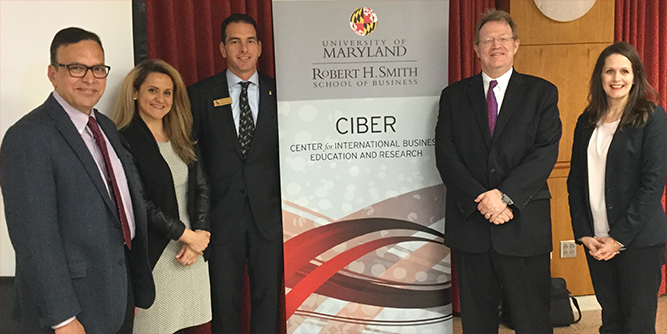
“Silicon Valley is just the tip of the iceberg.” – Erik Peterson, Partner and Managing Director, AT Kearney
The Center for International Business Education and Research (CIBER) at the University of Maryland’s Robert H. Smith School of Business hosted a discussion between Associate Dean and Professor, Mike Faulkender, and AT Kearney’s Partner and Managing Director, Erik Peterson on Feb. 21, 2017. Peterson had just completed a book highlighting top global business trends that will influence the lives of people in all geographic areas and of all demographics. Administration, faculty, graduate and undergraduate students were all invited to attend. They participated in the dynamic conversation after Faulkender and Peterson briefed the audience on the report. See the top five global business trends and brief remarks from Peterson that you should know below:
1. The rising storm of populism
- Many of the major votes across the world test the prevalence of the populist movements – from Brexit, the Trump Election, French Elections, the Italian Referendum and Five Star Movement, and many more. These movements reflect dissatisfaction with the state of affairs.
- Implications are that themes of innovation, productivity, and globalization that propelled Jeff Immelt’s career to CEO of GE are now being reviled and forcing GE to put more of its strategic focus domestically.
2. Latin America may begin to shift from populist cultures to adopting significant growth strategies and market friendly principles
- Ever since the collapse of the Soviet Union, there has been a growth in the middle class and this has reshaped the social fabric.
- Latin America’s biggest challenges will be overcoming past practices like corruption and unregulated business systems in order to maintain sustainable economic growth.
3. Changes in the global labor market
- The developed world is aging, but the developing world is very young. Japan is mired in aggregate population descent, and Europe has a few countries that are not too far behind. Due to the one child policy, recent studies project China to have more people over the age of 65 in 2035 than the total U.S. population.
- These advanced economies may also see population pressures as a result of migration.
4. Peak stuff consumerism
- Millennials are taking over and there is a rise in the “tiny house phenomenon,” a shared and gig economy, urbanization, and environmentalism. These priorities are somewhat different than those of millennial parents.
- These changes have inspired what an Ikea executive termed, “Peak Stuff.” Now that millennials may want less on average, automakers, real estate companies, and retail shops will struggle with how they are going to reach millennials.
5. Imminent CRISPR revolution
- Scientists are on the precipice of manipulating genetic codes for humans, as they have already done with agriculture. This presents remarkable ethical and legal challenges as regulation tries to keep up with the speed of innovation.
- Businesses are trying to harness these advancements to pursue business models such as exponential technology, artificial intelligence, 3D printing, virtual recognition, and advanced robotics.
- Governments will have to find a balance between regulation and creating conditions that will accelerate growth in these arenas to stay competitive in the global marketplace.
While speaking about these global business trends, Peterson highly recommended the following books: “The Great Degeneration” by Niall Ferguson and “The End of Power” by Moisés Naím.
After the opening discussion and questions from the audience, Faulkender asked questions that would integrate all of these ideas, which could further the audience’s thinking in the future. Peterson made the following remarks:
- Although populists believe governments need to have a stronger role in regulating economies, they will soon discover that it is hard to prioritize sectors in a highly interconnected and increasingly complex world.
- The world will need leadership that has strategic foresight to cushion the impact of population changes so that the next generation can take on the 21st century productively.
- Dealing with all of the issues discussed and not discussed needs to be dealt with multilaterally. We need to find ways that the private sector can help governments and civil society instead of allowing itself to be vilified.
- We must be careful of providing simple answers and solutions to complex problems. For example, we have an established supply chain for automobiles with Mexico. How will we build cars if we are not linked with what is happening outside of our borders?
- Although we did not list cybersecurity, this will also be a hot issue in 2017 and AT Kearney’s forecast period. WE must be tuned into the IoT revolution and billions of connected machines that could be subject to a major cyber event.
At the end of this insightful discussion, Faulkender asked Peterson to share some advice for the millennials in the room who are facing the future and building a career. Peterson said, “Absorb developments every single day and know what is happening across the world. Read five to six newspapers rapidly every day and stock up on knowledge. This is a remarkable environment for the intellectual. Silicon Valley is just the tip of the iceberg.”
For more information about the Smith CIBER, visit: www.rhsmith.umd.edu/ciber.
- Zane Adoum, Smith MBA Candidate 2018, Office of Marketing Communications
Media Contact
Greg Muraski
Media Relations Manager
301-405-5283
301-892-0973 Mobile
gmuraski@umd.edu
About the University of Maryland's Robert H. Smith School of Business
The Robert H. Smith School of Business is an internationally recognized leader in management education and research. One of 12 colleges and schools at the University of Maryland, College Park, the Smith School offers undergraduate, full-time and flex MBA, executive MBA, online MBA, business master’s, PhD and executive education programs, as well as outreach services to the corporate community. The school offers its degree, custom and certification programs in learning locations in North America and Asia.